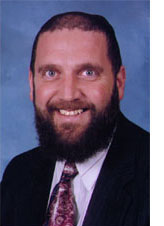By Rabbi Baruch Lederman

SAN DIEGO — “Vatikravnah bnos Tzelofchod…” “The daughters of Tzelofchod drew near… (Num 27:1)
The daughters of Tzelofchod were in a bind. Their father died in the wilderness. Moshe was about to apportion the land of Israel to all the Jewish families, but the land was given based on the man of the house. They had no man of the house. There was a mother and five daughters. They would not receive a portion.
The daughters felt that they were indeed entitled to a portion of the land. They sought out Moshe to make their case. They found him teaching and ruling on various cases of Torah.
They waited till he began discussing cases involving inheritances. At this point, they stepped forward and presented their question.
They contended that they should receive their father’s portion just like a son would in this case. If you say the daughters don’t count, they continued, then it should be treated like a case of man who dies childless, in which case our mother should be provided land through the leverite laws.
Moshe considered their argument and consulted with HaShem. HaShem told Moshe that the daughters of Tzelofchod were correct. They were to receive their father’s portion of the land.
The daughters of Tzelofchod were praiseworthy for many reasons. They were brilliantly well versed in Torah jurisprudence as evidenced above. Further, their desire for a portion was not simply a desire to increase their monetary possesions. It was driven soley by their love for the holy land of Israel.(Bamidbar Rabbah 21:10)
The Midrash (ibid) praises the daughters of Tzelofchod for one reason. Whatever that reason was, it must be huge because there were so many amazing virtues to choose from.
The Midrash singles out one virtue – their timing. The fact that they waited till the right time to approach Moshe and present their argument. This seems like a minor attribute but the
Midrash is teaching us otherwise.
The Midrash is teaching us that the crowning virtue of a mentch is seichel – common sense. The Rosh Yeshiva ztl used to tell us that you can have a person who can figure out how to get from here to the moon, but is unable to traverse the distance from one human being to another. You can have every quality in the world; but if you don’t have seichel, if you don’t have common sense, you are not going to get where you need to go.
The Torah relates that when Yaakov was on his way to meet Lavan, he stopped by some locals and inquired about Lavan’s welfare. Yaakov did this in order to adjust his greeting accordingly. If Lavan was having good times, Yaakov would greet him enthusiastically. If Lavan was suffering bad times Yaakov would tone it down. Yaakov had the foresight and seichel to do this.
When Rebbi Akiva was petitioning to have Shir HaShirim (Song of Songs) included in the Tanach, he got up on his feet and screamed, “If all the books are holy, Shir HaShirim is the Holy of Holies. (Mishnah Yadaim)” The Rosh Yeshiva ztl pointed out that Rebbi Akiva realized that at that moment in that situation, that speaking softly would not do the trick – he needed to get up and shout. The mishnah is teaching us a lesson in seichel.
Through the study of Torah and mussar, we can deepen our understanding of human nature. We can increase our seichel. We can gain that most uncommon commodity – common sense.
Dedicated by Rabbi & Mrs. Baruch Lederman in honor of Rabbi Yehuda Simes, Yehuda Pinchus ben Osna, L’Refua Shelaimah.
*
Rabbi Lederman is spiritual leader of Congregation Kehillas Torah in San Diego